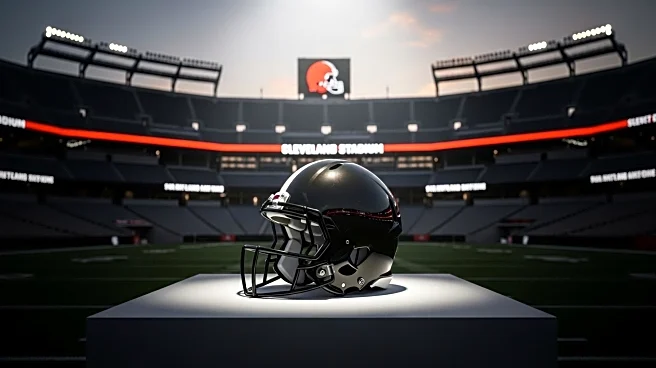What is the story about?
What's Happening?
The Cleveland Browns have reached a $100 million settlement with the city of Cleveland, allowing the NFL team to proceed with plans to relocate from downtown Huntington Bank Field to a new $2.4 billion domed stadium in suburban Brook Park, Ohio. The agreement, made between the Browns' ownership entity, Haslam Sports Group, and Cleveland Mayor Justin Bibb, includes financial payments and commitments to redevelop the city's downtown. Key terms of the deal involve Haslam Sports Group paying the city $25 million by December 1, followed by five annual payments of $5 million from 2029 to 2033. Additionally, the group will cover the $30 million cost of demolishing Huntington Bank Field after the team's departure in 2029. The Browns will also contribute $2 million annually to community benefit projects for ten years, totaling $20 million. The city will support infrastructure development related to the new stadium, lakefront redevelopment, and modernization of Cleveland Hopkins International Airport. All legal claims related to the team's move are dismissed.
Why It's Important?
This settlement is significant as it resolves a major dispute between the Cleveland Browns and the city, paving the way for substantial economic development in the region. The move to Brook Park is expected to stimulate local economic growth through the construction of the new stadium and associated mixed-use development. The agreement also ensures continued investment in Cleveland's community programs, which could enhance public infrastructure and services. The relocation may impact downtown Cleveland's economy, but the city's support for lakefront redevelopment and airport modernization could offset potential losses. The Browns' commitment to community projects reflects a strategic investment in the city's future, potentially benefiting residents and attracting new investments.
What's Next?
The final settlement requires approval from the city council, which will determine the project's progression. The Browns plan to break ground on the new stadium site early next year, marking the beginning of construction. Stakeholders, including local businesses and residents, may react to the development, influencing public opinion and future city planning. The city's focus on lakefront redevelopment and infrastructure improvements could lead to further economic opportunities and urban revitalization. Monitoring the project's impact on Cleveland's downtown and suburban areas will be crucial in assessing the long-term effects of the Browns' move.
Beyond the Headlines
The Browns' relocation raises questions about the balance between urban and suburban development, highlighting potential shifts in regional economic dynamics. The move could influence other sports franchises considering similar relocations, setting a precedent for negotiations between teams and cities. The agreement underscores the importance of strategic partnerships in urban planning, emphasizing collaboration between public and private entities to achieve mutual goals. The focus on community benefits reflects a growing trend of sports teams investing in local development, which may inspire similar initiatives across the country.
















